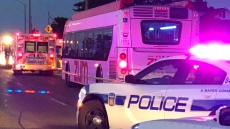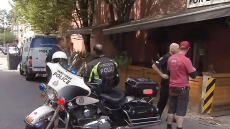VANCOUVER - Mayors in British Columbia's Lower Mainland have reached an agreement on an interim business licence for ride-hailing companies that want to operate in the region.
Surrey Mayor Doug McCallum, who has previously resisted the idea, threw his support behind the interim licence, saying it takes a major step forward in addressing the "unfair advantage" ride-hailing companies have over taxi businesses.
The mayors' council on regional transportation, made up of 23 mayors, endorsed the proposed bylaw covering Metro Vancouver, the Fraser Valley and Squamish-Lillooet on Thursday, with the details released publicly on Friday.
The council urged municipalities to begin adopting the interim bylaw as soon as possible, which would be in place until a permanent regional licence can be developed.
The proposed bylaw would establish a single set of requirements for all participating municipalities, charging ride-hailing companies a $155 annual fee plus a $150 per-vehicle charge, which would be waived for accessible vehicles.
The fee would be set at $30 for zero-emissions vehicles.
Vancouver is the only municipality that has its own business licence for ride-hailing companies and it would administer the interim regional business licence.
New Westminster Mayor Jonathan Cote, chairman of the council, said the licence "has demonstrated how our region can work collaboratively together."
"The framework that has been developed gives cities a say in managing our roadways while keeping the application process simple and reasonable," he said in a statement. "This industry has the potential to improve transportation options in our region, if we take steps to properly manage it."
The regional business licence would be required on top of provincial permits to operate.
The council also encouraged municipalities to harmonize current fees for cabs with fees set out in the regional business licence, while urging the provincial government to ensure fairness for the taxi industry by reviewing taxi boundaries, fleet caps and insurance requirements.
The B.C. Taxi Association said this week that it would stop subsidizing accessible vehicles because they are too expensive, and the mayors' council said Friday that the province should ensure a mechanism is put in place to subsidize accessible cabs or ride-hailing vehicles.
The council requested a meeting with the province and Passenger Transportation Board to discuss these issues.
Unlike other jurisdictions in North America, B.C. has only recently allowed ride-hailing companies, such as Uber and Lyft, to operate. The roll out has been fraught with growing pains, including legal action filed by taxi companies in an effort to revoke ride-hailing permits.
McCallum has been especially resistant, declaring that Uber is operating illegally in Surrey and threatening drivers with $500 tickets. The company responded by filing a court challenge to stop the city from issuing the fines.
The mayor said in a statement Friday he has not budged from his position that a level playing field must be in place for ride-hailing and taxi companies to compete.
"The (regional licence) approved by the mayors' council today levels the playing field and it has my support," he said.
"By having a single ride-hailing business licence for the region, this will eliminate duplication, confusion, and waste of time and money for both those issuing and seeking a licence."
B.C. Transportation Minister Claire Trevena said the approach by the mayors will eliminate "a patchwork system across the Lower Mainland" by allowing passengers to be picked up and dropped off between participating municipalities.
The government previously announced it is working with the Insurance Corp. of B.C. and the taxi industry to create a new insurance product for taxi drivers. And Trevena said in a statement the independent Passenger Transportation Board is responsible for supply caps, which it has confirmed could be reassessed as it monitors ride-hailing.
In a statement, Sophia Cote, public policy manager for Western Canada at Lyft, said the company is pleased there was agreement on the draft bylaw.
"We are optimistic that this draft bylaw will allow us to offer riders and drivers a more seamless transportation experience that reflects how people travel within the region."



